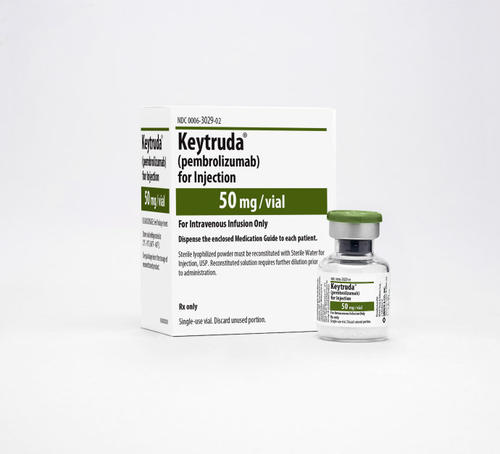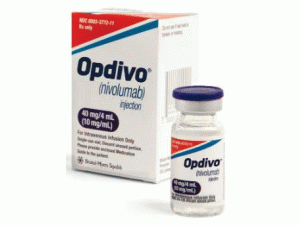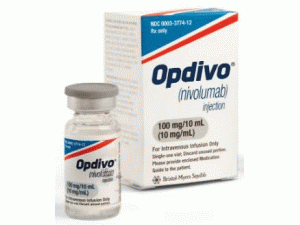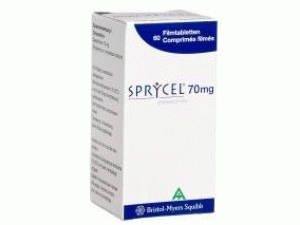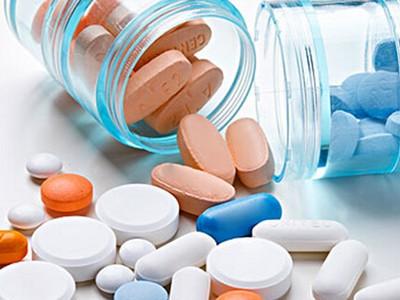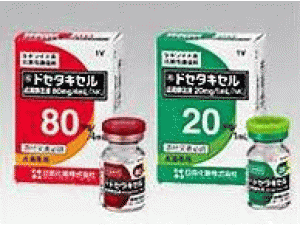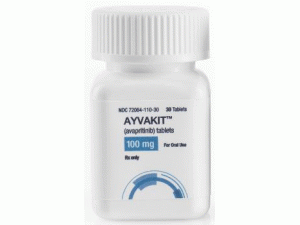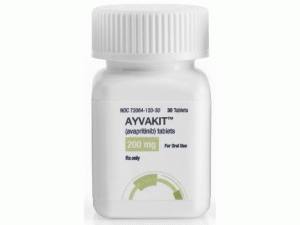诺维本胶囊VINORELBINE TARTRATE(NAVELBINE)
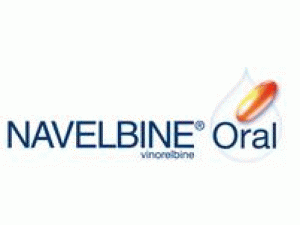 产地国家:美国
产地国家:美国
所属类别: 30毫克/胶囊 4胶囊/盒
包装规格: 30毫克/胶囊 4胶囊/盒
计价单位:盒
生产厂家英文名:PIERRE FABRE
原产地英文商品名:NAVELBINE 30mg/cap 4caps/box
原产地英文药品名:VINORELBINE TARTRATE
中文参考商品译名:诺维本 30毫克/胶囊 4胶囊/盒
中文参考药品译名:酒石酸长春瑞滨
简介:
诺维本(Navelbine)
【药物名称】长春瑞宾双酒石酸盐 vinorelbine ditartrate
【药物类别】抗肿瘤植物药
【药物别名】诺维本、长春瑞滨双酒石酸盐 navelbine
【分子式成分】本药每瓶含双酒石酸盐去甲长春花碱和注射用水。
【制剂规格】注射液 10mg/瓶。
【药理毒理】本药属于长春碱类抑制细胞分裂的抗肿瘤药物,直接作用于微管蛋白/微管的动态平衡,可抑制微管蛋白的聚合,并使分裂期微管崩解,仅在高浓度下影响轴突微管,对管蛋白螺旋化的作用低于长春新碱,通过阻断G2与M期细胞的有丝分裂,导致进入间期或分裂后期的细胞死亡。
【适 应 证】非小细胞肺癌、转移性乳腺癌以及难治性淋巴瘤、卵巢癌、头颈部肿瘤。
【不良反应】粒细胞减少,中度贫血。周围神经毒性反应:一般仅限于深腱反射降低,偶见麻木和感觉异常,长期用药可出现下肢无力。便秘,麻痹性肠梗阻罕见。偶见恶心和呕吐。呼吸困难或支气管痉挛。可在注药后数分钟或数小时内发生。可有进行性中度脱发,下颌痛,局部静脉炎。
【相互作用】勿用碱性溶液稀释,以免引起沉淀。
【用法用量】单药治疗:25-30mg/m2/周,静脉注射。
【用药须知】本注射液必须先用生理盐水稀释至50 mL,于短时间(6-10分钟)内经静脉输入,然后用250-500mL生理盐水冲洗静脉。必须确认注射针头在静脉内方可开始注射,药物若渗出静脉将引起局部强烈刺激反应,一旦药液外漏应立即停止注药,余药另换静脉注入。如药物不慎进入眼睛应立即用大量清水或等渗液冲洗。
【注意事项】严重肝功能障碍者,妊娠与哺乳妇女禁用。用药期间应密切观察血象变化,每次用药前均应检测血红蛋白、白细胞和粒细胞计数。当粒细胞少于2000/mm3时,需等到正常后再用本药。肝功能不全者应减量,肾功能不全者慎用。避免与肝脏放射治疗同时应用。
【生产单位】皮尔·法伯药物研制公司
英文版说明书:
Laboratories Pierre FabreNavelbineGeneric Name: VinorelbineOther Names: Vinorelbine TartrateDrug Type:Navelbine is an anti-cancer ("antineoplastic" or "cytotoxic") chemotherapy drug. Navelbine is classified as a "plant alkaloid."For more detail, see "How Navelbine Works" section below.What Navelbine Is Used For:Non-small cell lung cancerSome healthcare providers may also give Navelbine for breast cancer, ovarian cancer, or Hodgkin's disease.Note: If a drug has been approved for one use, physicians sometimes elect to use this same drug for other problems if they believe it might be helpful.How Navelbine Is Given:Navelbine is given through a vein by intravenous injection (IV push) or infusion (IV). There is no pill form.Navelbine is a vesicant. A vesicant is a chemical that causes extensive tissue damage and blistering if it escapes from the vein.The nurse or doctor who gives Navelbine must be carefully trained.If you notice pain, redness or swelling at the IV site while you are receiving Navelbine, alert your health care professional immediately.The amount of Navelbine you will receive depends on many factors, including your height and weight, your general health or other health problems, and the type of cancer being treated. Your doctor will determine your dose and schedule.Navelbine Side Effects:Along with its needed effects, Navelbine may cause some unwanted side effects. Important things to remember about the side effects of Navelbine include:Most people do not experience all of the side effects listed Side effects are often predictable in terms of their onset and durationSide effects are almost always reversible and will go away after treatment is completeThere are many options to help minimize or prevent side effectsThere is no relationship between the presence or severity of side effects and the effectiveness of Navelbine.The following side effects are common (occurring in greater than 30%) for patients taking Navelbine:Low blood counts. Your white and red blood cells may temporarily decrease. This can put you at increased risk for infection or anemia.Nadir: Meaning low point, nadir is the point in time between chemotherapy cycles in which you experience low blood counts.Onset: 4-7 daysNadir: 7-10 daysRecovery: 14-21 daysNausea or vomitingMuscle weaknessConstipationThe following are less common side effects (occurring in 10-29%) for patients receiving Navelbine:Pain along the site where Navelbine was givenPeripheral neuropathy (numbness in your fingers and toes) may occur with repeated doses.This should be reported to your healthcare provider.DiarrheaHair lossLow platelet (these help to clot the blood) counts. This can put you at increased risk for bleeding.Not all side effects are listed above, some that are rare (occurring in less than 10% of patients) are not listed here.However, you should always inform your health care provider if you experience any unusual symptoms.When To Contact Your Doctor or Health Care Provider:Contact your health care provider immediately, day or night, if you should experience any of the following symptoms:Fever of 100.5º F (38º C) or higher, chills (possible signs of infection)The following symptoms require medical attention, but are not emergency situations. Contact your health care provider within 24 hours of noticing any of the following.Nausea (interferes with ability to eat and unrelieved with prescribed medications)Vomiting (vomiting more than 4-5 times in a 24-hour period)Unusual bleeding or bruisingBlack or tarry stools, or blood in your stools or urineConstipationDiarrhea (4-6 episodes in a 24-hour period)Lip or mouth soresAlways inform your health care provider if you experience any unusual symptoms.Navelbine Precautions:Before starting Navelbine treatment, make sure you tell your doctor, as well as all healthcare providers, about any other medications you are taking (including over-the-counter, vitamins, or herbal remedies). Do not take aspirin or products containing aspirin unless your healthcare provider permits this.Inform your health care professional if you are pregnant or may be pregnant prior to starting this treatment. Pregnancy category D(Navelbine may be hazardous to the fetus.Women who are pregnant or become pregnant must be advised of the potential hazard to the fetus).For both men and women: Do not conceive a child (get pregnant) while taking Navelbine.Barrier methods of contraception, such as condoms, are recommended. Discuss with your doctor when you may safely become pregnant or conceive a child after therapy.Do not breast feed while taking Navelbine.Navelbine Self Care Tips:Apply warm compress if you have any pain, redness or swelling at the IV site, and notify your doctor.Keep your bowels moving. Your health care provider may prescribe a stool softener to help prevent constipation that may be caused by Navelbine.If you experience diarrhea of greater than 3-5 stools per day, contact your healthcare provider and increase your fluid intake.Drink 2 to 3 quarts of fluid every 24 hours, unless you were told to restrict your fluid intake, and maintain good nutrition. This will decrease your chances of being constipated, and prevent dehydration.You may be at risk of infection so try to avoid crowds or people with colds, and report fever or any other signs of infection immediately to your healthcare provider.Wash your hands often.Use an electric razor and soft toothbrush to minimize bleeding.Avoid contact sports or activities that could cause injury.Avoid sun exposure. Wear SPF 15 (or higher) sun block and protective clothing.To reduce nausea, take anti-nausea medications as prescribed by your doctor, and eat small, frequent meals.Keep your mouth clean with baking soda and salt rinses. You can mix 1/4 tsp. of baking soda and 1/4 tsp. salt in 8 ounces of water, and use as a mouthwash, to avoid or decrease the severity of mouth sores.In general, drinking alcoholic beverages should be minimized or avoided. You should discuss this with your doctor.If you experience symptoms or side effects, be sure to discuss them with your health care team. They can prescribe medications and/or offer other suggestions that are effective in managing such problems.Monitoring and Testing While Taking Navelbine:Periodic blood work will be obtained to monitor your complete blood count (CBC). Your doctor will order blood tests and other tests as needed to monitor side effects and check your response to therapy.How Navelbine Works:Cancerous tumors are characterized by cell division, which is no longer controlled as it is in normal tissue. "Normal" cells stop dividing when they come into contact with like cells, a mechanism known as contact inhibition.Cancerous cells lose this ability.Cancer cells no longer have the normal checks and balances in place that control and limit cell division. The process of cell division, whether normal or cancerous cells, is through the cell cycle.The cell cycle goes from the resting phase, through active growing phases, and then to mitosis (division).The ability of chemotherapy to kill cancer cells depends on its ability to halt cell division.Usually, the drugs work by damaging the RNA or DNA that tells the cell how to copy itself in division.If the cells are unable to divide, they die. The faster the cells are dividing, the more likely it is that chemotherapy will kill the cells, causing the tumor to shrink.They also induce cell suicide (self-death or apoptosis).Chemotherapy drugs that affect cells only when they are dividing are called cell-cycle specific. Chemotherapy drugs that affect cells when they are at rest are called cell-cycle non-specific.The scheduling of chemotherapy is set based on the type of cells, rate at which they divide, and the time at which a given drug is likely to be effective. This is why chemotherapy is typically given in cycles.Chemotherapy is most effective at killing cells that are rapidly dividing. Unfortunately, chemotherapy does not know the difference between the cancerous cells and the normal cells. The "normal" cells will grow back and be healthy but in the meantime, side effects occur. The "normal" cells most commonly affected by chemotherapy are the blood cells, the cells in the mouth, stomach and bowel, andthe hair follicles; resulting in low blood counts, mouth sores, nausea, diarrhea, and/or hair loss. Different drugs may affect different parts of the body.Navelbine belongs to a class of chemotherapy drugs called plant alkaloids. Plant alkaloids are made from plants. The vinca alkaloids are made from the periwinkle plant (catharanthus rosea).The taxanes are made from the bark of the Pacific Yew tree (taxus).The vinca alkaloids and taxanes are also known as antimicrotubule agents.The podophyllotoxins are derived from the May apple plant.Camptothecan analogs are derived from the Asian "Happy Tree" (Camptotheca acuminata).Podophyllotoxins and camptothecan analogs are also known as topoisomerase inhibitors. The plant alkaloids are cell-cycle specific. This means they attack the cells during various phases of division.Vinca alkaloids: Vincristine, Vinblastine and NavelbineTaxanes: Paclitaxel and DocetaxelPodophyllotoxins: Etoposide and TenisopideCamptothecan analogs: Irinotecan and TopotecanAntimicrotubule agents (such as Navelbine), inhibit the microtubule structures within the cell.Microtubules are part of the cell's apparatus for dividing and replicating itself. Inhibition of these structures ultimately results in cell death.Note: We strongly encourage you to talk with your health care professional about your specific medical condition and treatments.The information contained in this website is meant to be helpful and educational, but is not a substitute for medical advice.
药品价格查询,专业药品查询网站,药品说明书查询,药品比价 » 诺维本胶囊VINORELBINE TARTRATE(NAVELBINE)

